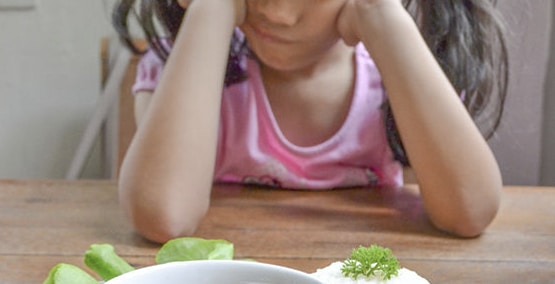
Appetite stimulants, the magic and the myths
The lifestyle changes and medications that can improve your child's appetite
-A small appetite is not uncommon in underweight children. Trying to make sure children get enough to eat can be so frustrating, especially when they refuse, clamp their mouths shut, and turn away. Some parents try playing games to get their kids to eat, or they try distracting them with television during meal time. Sometimes, even the grandparents are chasing the kids around the house when they're playing to stick a few bites in the kids mouths.
Why Won't Some Kids Eat?
For some kids, especially during the toddler years, they may not eat a full three meals a day. More often than not, children may not want to eat because:
- The kids are drinking too many fluids throughout the day. While proper hydration is important, the extra liquids can be filling and reduce appetite
- The kids are snacking too close to mealtime, decreasing their appetite
- Pediasure, Boost and similar beverages during the day are filling them up
- Drinks are offered when they sit down to eat, so they have no room left for their solid foods
- The kids are allowed to sit in front of televisions and other screens rather than playing and "working up an appetite"
With a couple of lifestyle adjustments, your child's low appetite could improve.

Inadequate Appetites
However, there are medical reasons why an appetite might be decreased such as:
- Nausea or vomiting
- Frequent feeling of fullness
- Inability to taste food
- Side effect of some medicines (ADHD medications are notorious for this)
Furthermore, a child might have a normal appetite, but his calorie needs are high because of increased metabolism, healing, or medical conditions that limit absorption. In those cases, the child's appetite may not be enough to keep up with their energy demands.
Appetite Stimulants
If lifestyle adjustments are not enough to stimulate your child's appetite, your child's pediatrician may prescribe an appetite stimulant. Most appetite stimulants are not used for very long, but rather to "jump start" a child's calorie intake. When they work, they can increase the kids' appetites 10-20%. Even just a 10% increase of a toddler's 1000 calorie diet means that (s)he will get an extra 100 calories a day– almost an extra pound per month.
Medications Used for Boosting Appetites
Cyproheptadine (Periactin)
An antihistamine related to Benedryl with additional Serotonin effect that stimulates the appetite. Widely used, though about 25% of patients will either have irritability or become sleepy. As a result, may physicians use this at bedtime to lessen the side effects. The good effects of the drug do seem to wear off for some with daily use, and as a result, some doctors use it 4-5 days a week or in other pulsed dosing.
Precautions: Not recommended for asthma sufferers or those sensitive to antihistamines. Used with caution in those with glaucoma, high blood pressure or cardiovascular disease.
Side effects: Fatigue, dry mouth, skin rash, chest congestion, headache, diarrhea, nausea, vomiting, difficulty urinating and blurred vision.
Interactions: Antihistamines, barbiturates, narcotic pain-relievers, certain antidepressants.
Progestins (megestrol, medroxyprogesterone)
A type of steroids, often used in those with cancer and chronic illnesses. Weight gain may result in more fat and fluid increase then muscle.
Side effects: Swelling of hands, feet and lower legs, headaches, blood clots, sensitivity to light. Long term use can result in similar side effects as regular steroids.
Interactions: No significant interactions are known.
Glucocorticoids (prednisone, methylprednisone and dexamethasone)
These are rarely used for appetite stimulation in children because of their side effects. But they are used for other purposes and do result in an increased appetite.
Side effects: Salt retention, high blood pressure, sugar instability and numerous problems with long term use.
Precautions: Patients using this drug should consume a high calorie, high protein diet to counteract wasting of muscle tissue. Children should get bi-annual x-rays to monitor growth. Blood sugars should be checked routinely due to rapid changes in blood sugar levels2.
Interactions: Aspirin, coumadin, warfarin, phenothiazine's, valproic acid, estrogen, gold salts, methotrexate, carbamazepine, amidarone, mercaptopurine, phenotoin, plicamycin, disulfiram, daunorubicon, chloroquine, methyldopa and naltrexone2.
Cannabinoids (dronabinol)
Not recommended for most children since it is one of the main chemicals in Marijuana.
Precautions: Patients on this medication should be closely monitored by their doctor for unpredictable changes in blood pressure or heart rate. Children, especially those with severe mental illness, should use caution because of neurological effects, be sure to notify the health-professional before using local or general anesthesia, as the drug could intensify anesthetic effects.
Adverse effects: Delirium, hallucinations, memory loss, euphoria, nervousness or anxiety2.
Interactions: Barbiturates, certain tranquilizers and antidepressants, narcotic pain relievers, anti-seizure medications, anti-histamines, muscle relaxants and anesthetics.
It is crucial for parents to talk to their healthcare provider about appetite stimulants, if interested in this approach. A physician or registered dietitian will be able to help you decide which medication is indicated for your child based on his or her health condition.




